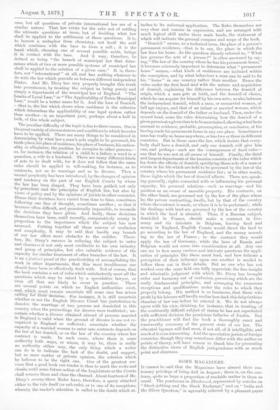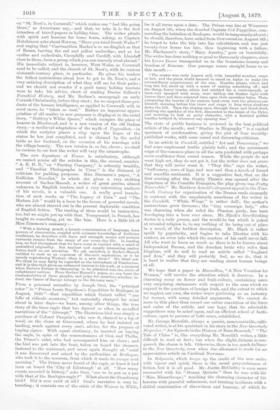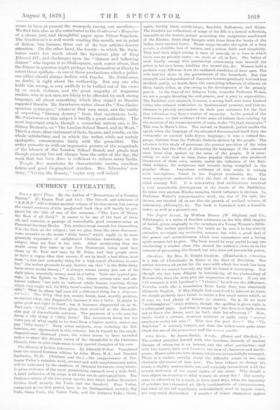on "St. Neot's, in Cornwall," which makes one "feel like
going there," as Americans say,—and that, we take it, is the first intention of travel-papers in holiday-time. The writer pleads with spirit and humour for home tours, asking, as Captain Hutchinson asks about Norway, "Have you tried South Wales?" and urging that "Caermarthen Market is as un-English as that of Rouen, barring the rod and yellow umbrellas ; and as for castles and cathedrals, Caerphilly and Cardiff, with Llauclaff close to them, form a group which you can scarcely rival abroad."
His immediate subject is, however, West Wales, as Cornwall used to be called, and the church of St. Neot's, with its curious sixteenth-century glass, in particular. He gives his readers
the fullest instructions about how to get to St. Neot's, and a very, enticing description of what they will see for their pains ; and we should not wonder if a good many holiday tourists
were to take his advice, short of reading Davies Gilbert's Parochial History, and Mr. BorIasels monograph on early Cornish Christianity, before they start ; for we suspect these pro- ducts of the human intelligence, as applied to Cornwall, will, in most cases, be "taken as read." Rather an ingenious appro.. priation of old matter to new purposes is displayed in the serial story, " Godfrey's White Queen," which occupies the place of honour in Blackwood, and is a new version of the old Italian story,—a medieval adaptation of the myth of Pygmalion,—in which the sculptor places a ring upon the finger of the statue ho has just completed, and is claimed by the awful bride as her husband, on the occasion of his marriage with the village beauty. The new version is, so far, clever ; we shall be curious to see how the writer will vary the catastrophe. The new departure of Fraser is satisfactory, although we cannot praise all the articles in this, the second, number. "A. K. H. B.," on "Parting Company," is solemnly twaddly, and "Familiar Photographs in Verse" is the thinnest of criticism for padding purposes. Miss Zimmern'e paper, "A Gallician Novelist," in which she gives a very striking account of Sacher-Masoch, a writer of great genius, almost unknown to English readers, and a very interesting analysis of his novels, is a valuable one. A really good transla- tion of such works as "The Legacy of Cain" and "The Modern Job" would be a boon to the lovers of powerful novels, who are almost starved out in the present deplorable condition of English fiction. The reading of them would be instructive, too, but we might put up with that. Tourguenicf, in French, has taught us something, yet we like him. Here is a little bit of Miss Zimmern's summary :—
"With a dashing pencil, a laconic concentration of language keen powers of observation, coupled with intimate knowledge of Gailician conditions, be describes with force and strength scenes and persons curiously remote from the range of our every-day life. In reading him, we feel throughout that we have come in contact with a mind of undoubted originality. But another and equally interesting matter forces itself on our attention. We ask ourselves, is Saeher-Masoch entitled to rank as an exponent of Slavonic aspirations, or is he merely reproducing Western ideas in a new dress P We think not. We think he may fairly be regarded as the hierophant of Panslavism, and it is this that gives an enhanced interest to his work, at a moment when Eastern Europe is elatnouring to be admitted into the circle of enlightened nations. From Sacher-Masoch's pages, we can learn the characteristics of these peoples, and judge for ourselves whether, in- deed, the future of Europe belongs to the Slavonic race."
From a personal narrative by Joseph Orsi, the "'principal actor" in "Prince Louis Napoleon's Expedition to Boulogne in August, 1840 "—that expedition which Guizot called "tine folio et ridicule aventure," but materially changed his mind about in later days—we learn, among other things, the true story of the tame eagle that has figured so often in so-called narratives of the "Attempt." The illustrious bird was simply a purchase of Colonel Pasquin's, who saw it, chained to a log of wood, on the shore at Gravesend, where he had insisted on landing, much against every one's advice, for the purpose of buying cigars. With equal obstinacy, he insisted on buying the eagle, in spite of the remonstrances of Orsi, and Than, the Prince's valet, who had accompanied him on shore ; and the bird was put into the boat, taken on board the steamer, fastened to the mainmast, and never again thought of, "until it was discovered and seized by the authorities at Boulogne, who took it to the museum, from which it made its escape next morning." The Prince never heard of the eagle, or knew it had been on board the City of Edinburgh' at all. "How many events recorded in history," asks Orsi, "are to be put on a par with that of the Boulogne eagle ?" What about the Strasbourg bird? Did it ever exist at all? Orsi's narrative is very in- teresting; it reminds one of the crisis of the Woman in White, for it all turns upon a date. The Prince was due at Wirnereux on August 5th, when the dreaded Captain Col Puygellier, com- manding the battalion at Boulogne, would be temporarily absent; he should, therefore, have sailed from Grave:lend on August 4th ; he forgot to take the tide into his calculations, and was just twenty-four hours too late, thus beginning with a failure.. Mr. Blackmore's story, "Mary Anerley," goes on beautifully. The writer has done nothing so good as these, early chapters, since- his Lorna Dome transported us to the bounteous beauty and freedom of Ex.moor. One passage comes straight home to us this month :—
" The season was early August still, -with beautiful weather come at last, and the green world seemed to stand on tiptoe to make the extraordinary acquaintance of the sun. Humble plants, which had long lain flat, stood up with a sense of casting something off ; and the damp, heavy trunks, which had trickled for a twelvemonth, or been only sponged with moss, were hailing the fresher light with keener lines and dove-coloured tints upon their smoother boles. Then, conquering the barrier of the eastern land-crest, rose the glorious sun himself, strewing before him trees and crags in long steep shadows down the hill. Then the sloping rays, through furze and brush-land, kindling the sparkles of the dew, descended to the brink of the Dyke, and scorning to halt at petty obstacles, with a hundred golden hurdles bridged it, wherever any opening was."
The state of public business is reviewed in the. best political article of the month; and "Studies in Biography" is a capital specimen of condensation, giving the gist of four recently- published works, with some sound and discerning criticism.
In' an article in CornItili, entitled "Art and Democracy," we find, some unpleasant truths plainly told ; and the permanent reign of the common-place in all the arts predicted with perhaps more confidence than sound reason. While the people do not want high art, they do not get it, but the writer does not prove
that they will never want it. "They like," says the writer, "buffoonery, rows of legs, and now and then a touch of forced
and maudlin sentiment. It is a suggestive fact, that on the first evening after the Gaiety Theatre was opened after the departure of the Comddie Franeaise, the play given was Pretty Esmeralda." Mr. Matthew Arnold's eloquent appeal in the Nine-
teenth Century for organisation of the Drama reads strangely
in contrast with the unpalatable assertions of the writer in the Corn,hin. "White Wings" is rather dull; the author's
mannerisms grow tiresome ; the "tiny sovereign lady," who. was charming when she ruled the Phaeton party, has been developing into a bore ever since. Mr. Black's free-thinking doctor is a rude person, and the would-be fun which is poked at revealed religion is, to say nothing of its being out of place in a novel, of the feeblest description. Mr. Black is rather spoilt by popularity, and begins to take liberties with his readers, an error into which the masters of his craft never fall.
All who want to know as much as there is to be known about Independent Burma, and the drunken brute who rules that kingdom, will do well to read an article called "England and Ava," and they will probably feel, as we do, that it is hard to realise that they are reading about human beings at all.
We hope that a paper in Macmillan, "A New Vocation for Women," will receive the attention which it deserves. In a charming essay on flower and fruit-culture, containing some
very surprising statements with respect to the sum which we- expend in the purchase of foreign fruit, and the extent to which we neglect our own, the writer urges gardening as an industry for women, with many detailed arguments. We cannot do more in this pla,ce than record our entire conviction of the force and value of the article, and our hope that its admirable suggestions may be acted upon, and an efficient school of horti- culture, open to persons of both sexes, established.
Mr. George Meredith, always a quaint, unaccountable, culti- vated writer, is at his quaintest in his story in the New Quarterly. Magazine," An Episode in the History of Beau Beamish." "The' • Tale of Chloe" is, like everything Mr. Meredith writes, a little difficult to read at first ; but when the slight distaste is con- quered, the charm is felt. Otherwise, there is too much dullness in the New Quarterly, even when due allowance is made for an appreciative article on Cardinal Newman.
In Belgravia, which keeps up the credit of the new series with vigour and spirit, there is • the .usual preponderance of fiction, but it is all good. Mr. Justin McCarthy is even more successful with his "Donna Quixote" than he was with his "Miss Misanthrope ;" touching the charming character of his heroine with graceful refinement, and treating incidents with a skilful combination of shrewdness and humour, of which he
seems to have at present the monopoly among our novelists.— We find him also as the contributorto the Gentleman's Magazine of a clever, just, and thoughtful paper upon Prince Napoleon. The Gentleman's is well worth reading this month, not in point Of fiction, but beeause three out of its four articles deserve attention. On the other hand, the fourth—in which Mr. Swin- burne rants too much about the historical play of King Edward IlL, aud discharges upon the "blatant and bellowing dunces" who impute it to Shakespeare, such coarse abuse, that the dunces in question might perhaps feel themselves at liberty to retort those epithets—is one of those productions which a judici- ous editor should always decline with thanks. Mr. Swinburne, no doubt, is right about the authorship. But any one who holds him wrong, is very unlikely to be bullied out of his views by so much violence, and the great majority of magazine readers, who do not care, are likely to be offended by such strong language, all about something which they regard as Hamlet regarded Heeuba. Mr. Swinburne writes about the " Neo-Shake- spearean synagogue," whatever that may mean, and the vanity of expecting " literary decency" from that mysterious body. Mr. Swinburne on this subject is hardly a great authority. The most important article, though a somewhat serious one, is Mr. Sidney Buxton's, on "The London School Board, and its Work." This is a close, clear statement of facts, figures, and results, on the whole satisfactory, and in which the writer, while not unduly apologetic, remonstrates fairly with the grumblers. The writer presents us with an impressive picture of the magnitude of the labours of the London School Board, and pleads that though economy has not always been the order of the day, the work that has been done is sufficient to redeem many faults.
Temple Bar maintains its characteristic merits, excellent fiction and good biographical sketches. Mrs. Edwardes' new Story, "Vivian, the Beauty," begins very well indeed.




































 Previous page
Previous page